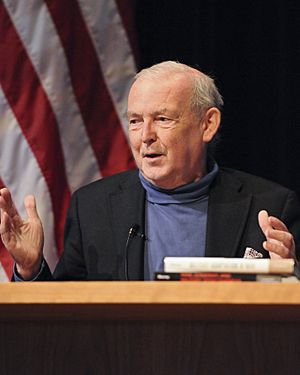Paul Kennedy facts for kids
Quick facts for kids
Paul Kennedy
|
|
|---|---|

Kennedy in 2012
|
|
| Born | 17 June 1945 Wallsend, Northumberland, England
|
| Alma mater | |
| Scientific career | |
| Institutions |
|
| Doctoral advisor | A. J. P. Taylor John Andrew Gallagher |
| Doctoral students | Richard Drayton Matthew Connelly |
Paul Michael Kennedy is a famous British historian. He was born on June 17, 1945. He studies how countries interact with each other, how their money affects their power, and how they plan big strategies. He writes for important newspapers and magazines like The New York Times. He also has a column about world issues that is read all over the world.
Professor Kennedy has written many books about how countries' power changes over time. He often explains how a country's money and economy are linked to its military strength. He shows that if a country's economy gets weaker, its military and influence in the world might also become less powerful.
Contents
About Paul Kennedy
Early Life and Education
Paul Kennedy was born in a town called Wallsend in England. He went to St. Cuthbert's Grammar School in Newcastle upon Tyne. After school, he studied history at Newcastle University and earned top grades. He then went on to get his advanced degree (called a doctorate) from St Antony's College, Oxford. His teachers there were famous historians A. J. P. Taylor and John Andrew Gallagher.
Teaching Career
From 1970 to 1983, Professor Kennedy taught in the History Department at the University of East Anglia. He has also been a visiting scholar at important places like the Institute for Advanced Study in Princeton, New Jersey. In 2007 and 2008, he was a special professor at the London School of Economics.
In 1983, he became a professor of British History at Yale University in the United States. Today, he is also the Director of International Security Studies at Yale. He teaches a special course there called "Studies in Grand Strategy" with other well-known professors. In 2012, Professor Kennedy started teaching a course at Yale called "Military History of the West Since 1500." In this course, he teaches how military history is connected to a country's money and new technologies.
Famous Books
The Rise and Fall of the Great Powers
Professor Kennedy's most famous book is called The Rise and Fall of the Great Powers. This book looks at how money and strategy have affected countries over the past 500 years. Many historians really liked the book. A. J. P. Taylor called it "an encyclopaedia in itself," meaning it was full of information. Another historian, Sir Michael Howard, said it was a "deeply humane book." This book has been translated into 23 different languages, showing how popular and important it is around the world.
The Parliament of Man
In 2006, Professor Kennedy wrote another book called The Parliament of Man. In this book, he thinks about the past and future of the United Nations. The United Nations is an organization where countries work together to solve global problems.
Awards and Recognition
Paul Kennedy has received many awards for his work.
- In 1989, he was chosen to be part of the American Academy of Arts and Sciences.
- In 1991, he joined the American Philosophical Society.
- In 2001, he was made a Commander of the Order of the British Empire (CBE) by the British government.
- In 2003, he became a Fellow of the British Academy.
- The National Maritime Museum gave him the Caird Medal in 2005 for his important work on naval history (the history of navies and sea power).
- In 2014, he received the Hattendorf Prize from the US Naval War College.
Notable Students
Professor Kennedy has taught many students who went on to become successful in their own fields. Some of his notable students include:
- Geoffrey Wawro
- Richard Drayton
- Fareed Zakaria
- Frederick Kagan
See also
 In Spanish: Paul Kennedy para niños
In Spanish: Paul Kennedy para niños
 | Mary Eliza Mahoney |
 | Susie King Taylor |
 | Ida Gray |
 | Eliza Ann Grier |

